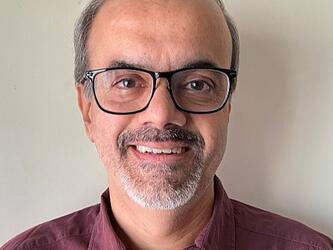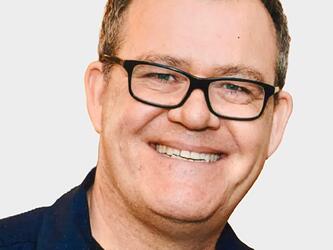A woman of substance
It is a source of amusement to Joanna Swash that every time she goes back to her old school (“state school”, she emphasises), the same one her children now attend and where she is a parent governor, she remembers her three Ds at A level and the teachers’ comments that “I would never make much of myself”.
Swash is the group chief executive of Moneypenny, an outsourced communications provider that handles more than 20 million calls, live chats and online interactions annually for 21,000 companies – from the likes of BMW and Innocent to SMEs – in the UK and the US. She has also recently been appointed to the Prime Minister’s new Business Council, established to translate the ‘levelling up’ slogan into practical actions that will boost productivity and growth throughout the UK. “There are three pillars – innovation, infrastructure and skills and I’m going to be working on the skills side,” she says.
There is a great deal of work to be done, says Swash, on raising young people who are equipped to work, giving them good career advice, and better connecting the education and business worlds.
“We shouldn’t be measuring success by the number of pupils who go to university,” she insists. “No wonder so many graduates wish they had done an apprenticeship instead, or are unhappy in their jobs – and we’ve got a skills crisis.
“We should be measuring success by the number of people who, 10 years after they leave school, are living a happy fulfilled life and doing a job they adore. If you measure the wrong things, you get the wrong result.”
People at Moneypenny, by all accounts, are doing a job they adore. Famous for a culture based on mutual trust and respect, the company is regularly recognised in the top 10 of the Sunday Times Best Companies to Work For list.
A very visible (but by no means the only) manifestation of the board’s efforts to ensure that staff are happy, engaged and supported is the bright and lofty modern atrium in the company’s Wrexham head office, which – with its treehouse, model giraffes, and aptly named Dog and Bone pub – resembles a playground for adults.
Happy equation
If staff are happy, then customers are happy, says Swash; for her, it’s a simple equation. “My job is to keep people happy so that clients get long-term relationships that benefit their brand. So, we need a great reputation as a good employer, which allows us to cherry pick the best people locally, and then ensure they feel safe and secure, and happy enough to want to stay with us.”
It’s the same with employees as it is with clients, she continues: “We are open to feedback, we solicit feedback, and we act on feedback – and, since the beginning of the pandemic, we are listening more intently than we ever have.”
If the formula is so simple, however, and it yields such great returns (the company expects revenue to grow by 15% this year, to more than £60m), why don’t more companies emulate the Moneypenny culture?
“Leaders have to live and breathe the values, and ego often gets in the way,” Swash explains. “You know the kind of thing – ‘I’ve worked my way up the organisation and I like having my dedicated car parking space’. You can’t be like that if you want a culture of equality. I believe in ‘servant leadership’ – it’s not about what my business can do for me, but what I can do for my business. So, if I walk into the kitchen here and there are pots around, I’ll clean them. You do what you can to make it a good environment.”
The culture at Moneypenny is rooted in firm foundations. The business was established in 2000 by brother and sister Ed Reeves and Rachel Clacher, and, from the start, they planted themselves firmly in their employees’ and customers’ shoes. The novel idea at the heart of the venture was to make answering services more personal, by ensuring that Moneypenny people taking the calls on behalf of clients had a strong relationship with those clients: each client has a dedicated, hand-picked PA.
The company’s enduring ability to understand fully its clients’ and its staff’s requirements, combined with its commitment to technological innovation and a strong teamworking ethos, mean it has weathered the two years of Covid lockdowns better than many. It migrated its then 1,000-strong workforce to home working in just three weeks, with barely a ripple to business continuity.
While trying to ensure that remote staff were well supported, physically and emotionally (regular brownie parcels and ‘care packages’, along with Christmas roasts, found their way to employees during the lockdown), the business was also at pains to support its clients in their hour of need. It introduced short-term and flexible contracts and payment freezes, as well as innovative new services, such as a digital switchboard solution, to help manage high volumes of calls to its employees without compromising the end-customer experience.
These measures meant that, while there was a 50% drop in call traffic during the first lockdown – mostly caused by small businesses closing – call volumes quickly returned to 116% of their pre-lockdown levels, reflecting the growing demand from businesses to facilitate home working for their staff and adopt new technologies to support them.
While some of this growth was organic, Moneypenny used the first lockdown as an opportunity to win more customers by taking advantage of cheap advertising rates. When everyone else was pulling in their horns, it poured its marketing budget into a radio campaign and full-page ads in the Sunday broadsheets bearing the strapline, “Maintaining a reputation like yours is how we’ve built ours”.
“I went down to the Co-op, with my mask on, and came back and filmed myself for Workplace [the medium she uses to post regular updates to staff] unpacking the shopping and looking at the ads in the papers,” recalls Swash. “I felt a mixture of pride in the brand, and awareness of the enormous risk we’d taken.”
Doing things differently
The advertising campaign was a first, and it paid off. The following week, there was a flurry of calls from big law and accountancy firms. “We were absolutely hitting our target market,” says Swash. “Larger businesses take longer to change their strategy, but you have to educate them and work with them, to the stage where they trust you to do a good job with their brand.”
But she thinks a greater acceptance of risk is one of the outcomes of the pandemic. “Historically, our clients have been early adopters, and that’s changing,” Swash observes. “Because we all had to do things differently, almost overnight, doing things differently is becoming more normal.”
One seismic shift is that companies are redefining their workplaces. In a few short weeks, the pandemic achieved what some had been advocating for years – a more flexible working approach, including more home working – along with a realisation by employers that staff are equally, if not more, productive when they work remotely. It’s strange that the old 9-to-5 ‘factory’ model has persisted so long, given most people no longer need to be together, in one place, between set times, Swash points out.
As they manage the return to work, however, companies – including Moneypenny – are trying to work out how to implement a hybrid model that works for everyone. “During the crisis, most of us managed to spin off a home-working model in weeks. It wasn’t perfect, but it would have taken 18 months to get a perfect one, because you’d have looked at it from all sides,” says Swash. “What we did showed how resilient and flexible UK business leaders and teams could actually be. At Moneypenny, we had to tweak and adjust and patch things up as we went along, but we had something that worked – and, crucially, that worked for our customers.”
It is now focusing on what “a truly extraordinary home-working model” would look like. Not only is hybrid working here to stay, but it also works in companies’ interests, points out Swash. At Moneypenny, this is manifested in a very obvious way: it has recruited 300 people since the start of the pandemic and having employees working from home part of the time means it doesn’t need to take on any more office space at the moment.
We mustn’t, however, throw the baby out with the bathwater, she warns. “We are all human, and largely sociable creatures; we have friends at work and we’ve missed each other,” Swash says. “Culture thrives on being able to see each other face to face, and we’ve got to replicate that with a hybrid model. So, when people are in the office, we need to ensure they get the most out of being there, while at the same time making sure people at home still feel involved, loved and engaged.”
Aspects of the authentic leadership that Swash espouses, and that does so much to make staff feel involved, loved and engaged, include a lack of ego and a willingness to admit to mistakes and ask for help. She’s refreshingly honest about her failures – like the small business she tried to run before she joined Moneypenny.
“I set up a company to re-manufacture laser-printer cartridges, on a very small scale. But it was messy, and it was really hard work. I was great at sales, but not so great at everything else,” she admits. “My mum said to me, ‘for goodness’ sake, go and get a proper job’.” So she did, joining Moneypenny in 2005 as its first salesperson.
What was it about her that impressed Reeves and Clacher, and that allowed her to rise so smoothly through the ranks? She was commercial director until 2016, when she became managing director, and was promoted into her current role in 2018.
“They trusted me in the sales role, and I understood clients and the products, and the importance – and nuances – of keeping people happy,” Swash says. “I also had an entrepreneurial approach: my mantra is ‘why not?’. And I like to put myself in others’ shoes. It got to the point where they trusted me to lead the business in a way that allowed them to step back.”
Reeves remains a director and is an active member of the board, but Clacher now focuses on her charity, WeMindTheGap, which began as the Moneypenny Foundation with the vision of giving new life and work opportunities to underserved people in local communities.
Swash tries to give the same space to her top team. “Another of my mantras is ‘only do what only you can do’,” she says. “Sometimes, it would be nice to do other people’s jobs – it makes you feel needed. But if you employ a talented top team, as we do here, you have to trust them to get on with it. I help them set the strategy and support them when necessary, and then I get out of their way.”
But doing what only she can do gets more and more difficult the stronger the team becomes.
“I take myself out of my comfort zone all the time so that I continue to learn and grow,” Swash says. “That allows others to come up behind me – I’m creating a vacuum.”
Giving back
She focuses on business development, the brand, and motivation, and is spending a lot of time building the US business. Moneypenny launched in the US in 2015 and, in 2018, won private-equity funding to fuel its ambitious States-side growth plans. In March 2020, it bought two US answering-service companies, Ninja Number and VoiceNation, and a year later acquired offices in Atlanta. “We signed a lease on 30,000 square feet of office space on FaceTime,” recalls Swash.
Her extracurricular activities are about ‘giving back’, but they also help to build the brand. In addition to the Business Council, she is involved with The Good Business Charter and Northern Powerhouse, and she mentors young entrepreneurs running fast-growing companies for the Be the Business organisation. The day after we speak, she is due to give a presentation to 40 ‘future leaders’ in the property industry – a large and fast-growing sector for Moneypenny.
At the time of writing, the detailed remit of the Business Council is still to be decided, but Swash is already “being vocal, spreading the word, getting the views of our own people, our clients and the local community, and taking them back to the council. I’m thrilled and honoured to have been given a seat at the table, and my responsibility is to do as much as possible to get the ear of others, in order to deliver change”.
Rachel Clacher “could not be prouder” of her former protégée. “To watch her growing our business is humbling,” she says. “A brilliant leader”, she is ideally placed to drive “powerful national conversations about purpose, opportunity and investment in our people and communities”.
As for Swash, she remains resolutely upbeat: “I’m doing this amazing job, in an amazing company, with amazing people – I’ve been given this new opportunity and intend to make the most of it.”

We hope you enjoyed this article.
Research Live is published by MRS.
The Market Research Society (MRS) exists to promote and protect the research sector, showcasing how research delivers impact for businesses and government.
Members of MRS enjoy many benefits including tailoured policy guidance, discounts on training and conferences, and access to member-only content.
For example, there's an archive of winning case studies from over a decade of MRS Awards.
Find out more about the benefits of joining MRS here.













0 Comments